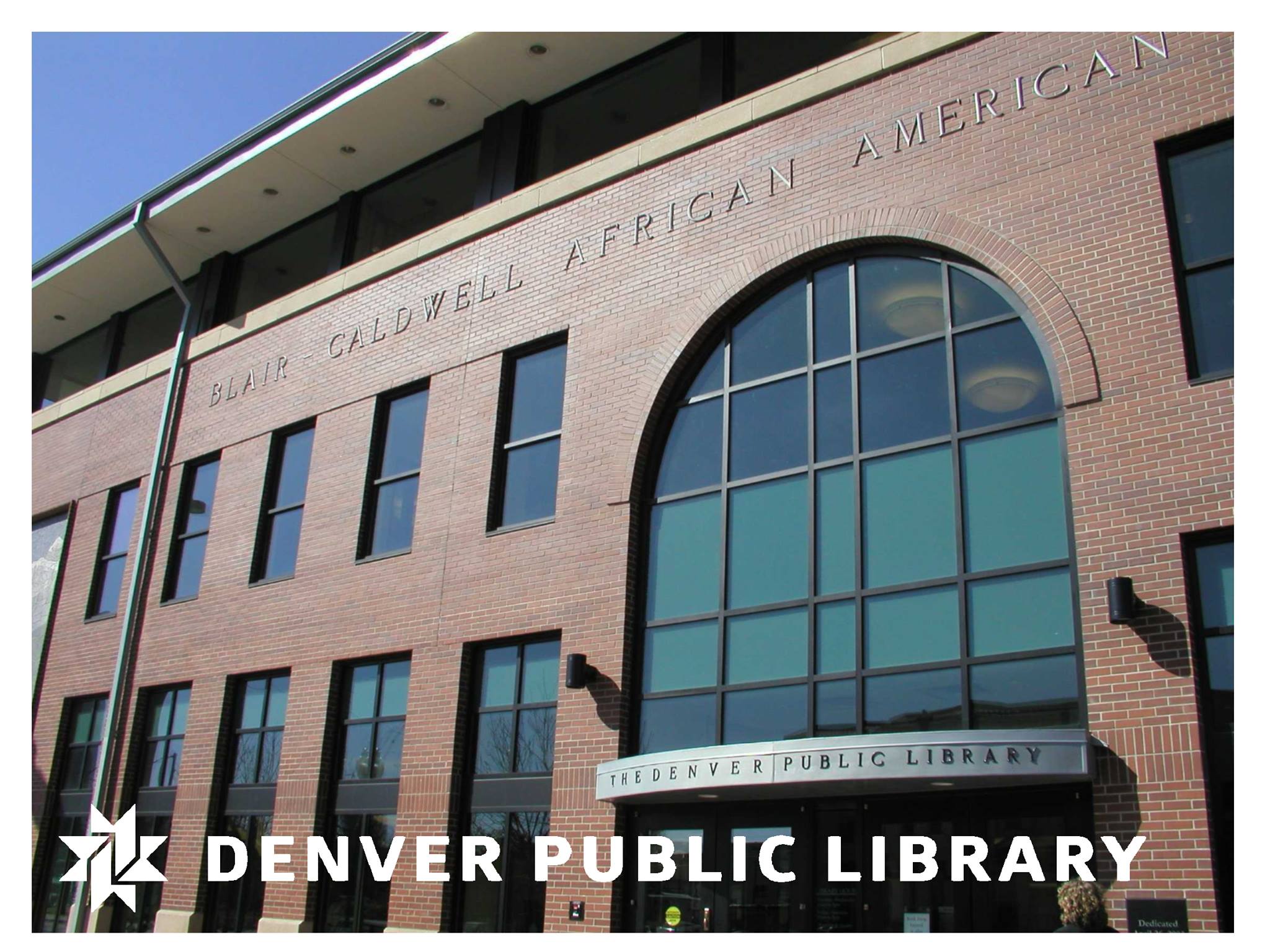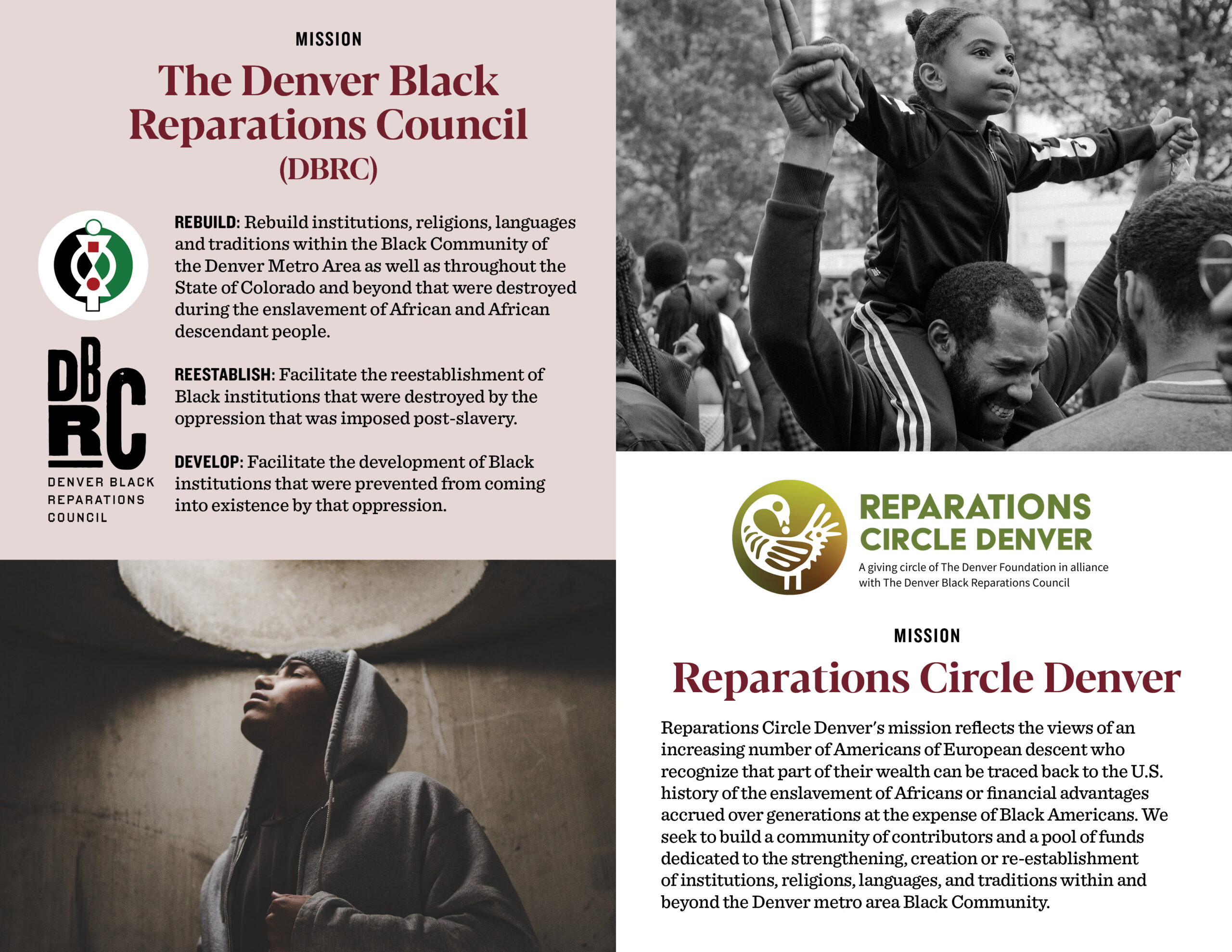Rebuilding and sustaining African institutions and traditions
The Denver Foundation is pleased to invite qualified organizations to apply for funding from the Denver Reparations Fund.
Denver Black Reparations Council (DBRC) and Reparations Circle Denver (RCD) are working together to effect reparative change. RCD is a giving circle in Denver that accepts new members and funds the Denver Reparations Fund; DBRC grants funds from the Denver Reparations Fund to benefit communities of Coloradans whose ancestors experienced hardships under chattel slavery and Jim Crow.
Coloradans have continued to face marginalization through harms like redlining, gentrification, mass incarceration, and unequal access in areas such as education, employment, and healthcare. These harms have perpetuated inequality and limited economic opportunity. Our reparative grants focus on restoring and sustaining institutions and traditions harmed by the legacy of chattel slavery, Jim Crow segregation, and the ongoing structural disadvantages affecting Coloradans.
Applicants must be Colorado 501©3 organizations focused on serving the communities harmed by the legacies of chattel slavery and Jim Crow in Colorado and have substantial representation of persons whose ancestors experienced these harms and hardships within their leadership structures.
Funds are awarded by DBRC in one cycle each year. Grants from the fund range from $2,500 – $7,500 and are awarded annually. There is a total of $50,000 available for each cycle.
ELIGIBILITY
- Your organization must be a 501(c)(3) nonprofit organization or have a 501(c)(3) fiscal sponsor.
- Your organization must be located in and do work in the state of Colorado.
- Your organization must be focused on redressing the harms that accrued to Coloradans affected by the legacies of chattel slavery and Jim Crow segregation, including current structural disadvantages.
- Your organization must have substantial representation of persons whose ancestors experienced these harms and hardships within their leadership structures.
- Organizations that fall outside of these definitions and eligibility requirements but have a specific program that fits the fund’s priorities may apply for a program-specific grant.
- Beyond the basic eligibility requirements, the organization’s work must also fit one or more of the priorities identified below:
- Build economic strength, generational wealth acquisition, and financial literacy.
- Preserve, provide access to, and expand the history, culture, knowledge, and awareness of communities in Colorado shaped by the legacies of slavery and Jim Crow.
- Enhance mental and physical health access and increase public health education.
- Provide quality education from early childhood through adulthood, including reimagination of career options and pathways.
- Enhance community building and advocacy that responds to the needs of Colorado residents living in communities shaped by the legacies of slavery and Jim Crow.
- Provide access, including transportation, to critical life-sustaining services.
- Create openings for transformative change that are both systemic and relational.
Grant awards given in previous years are no guarantee of future grant awards.
Not eligible for funding:
- Organizational membership campaigns, drives, or events
- Debt retirement
- Endowments or other reserve funds
- Grants that further political activities or candidates
- Grants that further religious doctrine (community benefit programs qualify)
- Capital campaigns
- Grants to individuals
- Grants for re-granting purpose
Additional information
This funding opportunity has one grant cycle each fall. Applications are open from Aug. 1- Sept. 15.

Why reparations? Slavery was, and continues to be, fundamental to the foundation of the U.S. economy and wealth. “By 1860, there were more millionaires (slaveholders all) living in the lower Mississippi Valley than anywhere else in the United States. In the same year, the nearly 4 million American slaves were worth some $3.5 billion, making them the largest single financial asset in the entire U.S. economy, worth more than all manufacturing and railroads combined.
So, of course, the war was rooted in these two expanding and competing economies—but competing over what? What eventually tore asunder America’s political culture was slavery’s expansion into the Western territories.” – David Blight, author of Beyond Freedom: Disrupting the History of Emancipation.
The U.S. government has never fully accounted for the human rights violations of enslavement, thousands of lynchings, Black Code laws, Jim Crow segregation, the predatory practices of redlining, contract buying, blockbusting, or mass incarceration. Black Americans have experienced 246 years of slavery compared to 156 years of “freedom.” It is time for the U.S. – specifically European-Americans – to take action to repair the harms of slavery and its aftermath.
Not a 501(c)(3) but might otherwise qualify for a grant? Denver Black Reparations Council issues grants directly to individuals, businesses, and other organizations focused on serving the communities harmed by the legacies of chattel slavery and Jim Crow in Colorado. Please check DBRC’s website regularly for more information about our alternative funding opportunities.


